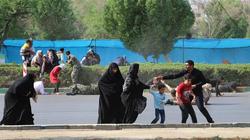 The demotion of an Iranian journalist by the Guardian newspaper has brought the British media’s anti-Iran agenda into sharp relief.
The demotion of an Iranian journalist by the Guardian newspaper has brought the British media’s anti-Iran agenda into sharp relief. RNA - The controversy centers on Saeed Kamali Dehghan, a London-based Iranian-born journalist who previously covered Iran issues for the London Guardian.
Am I a spy, a liar, psychotic, schizophrenic, mentally disturbed, an attention seeker, a loser, or am I just a journalist silenced by his employer and intelligence services? You decide. This is your Dreyfus affair moment in some ways, this time with a Muslim Iranian journalist.
— Saeed Kamali Dehghan (@SaeedKD) February 25, 2020
The Guardian has reportedly reassigned Dehghan after ten years of covering Iran-related issues for the left-of-center daily.
In hindsight, Dehghan’s downfall began when he tried to report relatively fairly on the terrorist attack in Ahvaz in late September 2018.
Whilst much of the British and Western media were focused on framing the terrorist attack as an assault on a military target, Dehghan and the Guardian pointed out that children were among dozens of people killed in the indiscriminate attack.
Supporting terrorism
Shortly after the attack, a spokesman for al-Ahwaziyeh group, claimed responsibility for the terrorist attack in a live interview with Iran International, a London-based anti-Tehran TV channel directly funded by Saudi Crown Prince Mohammad bin Salman.
Dehghan dug an even bigger hole for himself by trying to expose Iran International’s deep links with the Saudi regime.
In a series of tweets following the brutal murder of dissident Saudi journalist (and former insider) Jamal Khashoggi in the Saudi Consulate in Istanbul in early October 2018, Dehghan attempted to investigate the connections between Iran International and Saudi Arabia’s rogue Crown Prince.
In a bold statement, Dehghan claimed that Khashoggi was killed because he had exposed Saudi Arabia’s role in fully financing the London-based anti-Iran broadcaster, Iran International.
Dehghan claimed Khashoggi had communicated that information to him in a phone call shortly before his death.
Many people treated Dehghan’s allegations with a strong degree of skepticism, including Iranian foreign minister, Mohammad Javad Zarif, who was quick to point out that Khashoggi’s murder was more “complicated” than the reductive scenario set out by Dehghan.
A questionable character
Dehghan is known to have mental health issues and has been hospitalized on psychiatric grounds on numerous occasions. He is currently hospitalized at the Nightingale hospital in London following his latest mental breakdown.
Nightingale hospital is unlawfully preventing me - an informal patient who has not been sectioned this time and has not been given a diagnosis yet - from leaving the hospital for a 30-minute swim.
— Saeed Kamali Dehghan (@SaeedKD) February 25, 2020
It is worth pointing out that Dehghan can in no way be described as sympathetic to Iran. Indeed, he has been part of the British information warfare system for a decade.
However, what his case demonstrates is that even mild dissension from the anti-Iran line can have dire professional consequences in the UK.
Blaming Iran for COVID-19
The anti-Iran propaganda machine is currently hard at work misrepresenting Iran as the source of the Coronavirus infection in the West Asia region.
The emphasis on depicting the shrines in the holy city of Qom as a source of the infection betrays the British media’s agenda in presenting Shia Islam – and specifically its idiosyncratic culture and rituals – as problematic in the spread of COVID-19.
At least 210 coronavirus patients have died in Iran - far more than officially admitted - Iranian health sources tell BBC
Latest: https://t.co/nB7EwoM1qB pic.twitter.com/VbabRkuI88
— BBC Breaking News (@BBCBreaking) February 28, 2020
Any journalist who dares dissent from this line risks paying a high price, including the loss of career and livelihood.
847/940